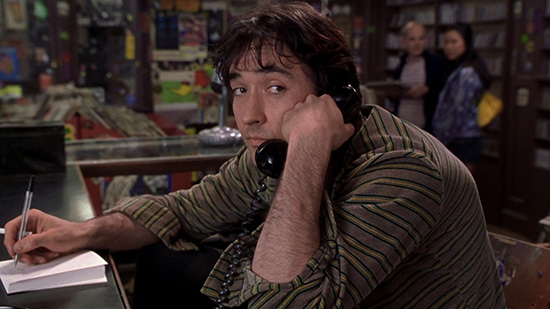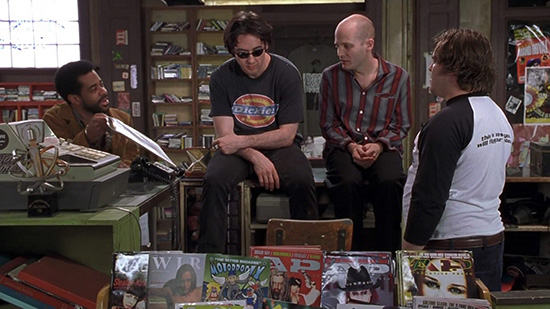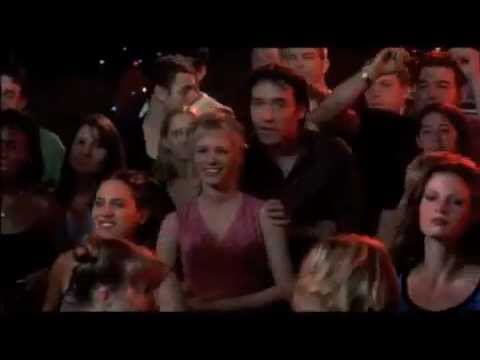It used to be that my favourite romantic comedies were the ones in which the main couple didn’t end up together. High Fidelity changed that.
But first, my desert island, all-time, top-five Russian authors – in chronological order – are as follows:
Fyodor Dostoevsky
Leo Tolstoy
Yevgeny Zamyatin
Mikhail Bulgakov
Vladimir Nabokov
It was Tolstoy who said that sharing common tastes and interests with others is much more powerful than thinking, or even behaving, in similar ways. Or as Rob Gordon famously says around the midpoint of High Fidelity, “What really matters is what you like, not what you are like.”
What Nick Hornby’s 1995 bestselling novel, to which the 2000 film is remarkably loyal, doesn’t go on to say, as Tolstoy also did, is that happy couples are all alike, and every unhappy couple is unhappy in its own way. Because that’s also true of Rob’s romantic relationships, which seem to fail for different reasons, but always do – whether it ends up being the fault of him, or the other party (usually him).
What’s more interesting about the film is just how comfortably it sits in the self-reflective, nostalgic melancholy it calls home. The notion that our early romantic experiences feed our expectations for the rest of our lives isn’t a particularly controversial one among psychologists, but it’s far from commonplace in mainstream romantic comedies where “this one will change everything” is too often the thesis statement. After recalling the end of his first, six-hour schoolyard relationship with Alison Ashmore, Rob concludes, “All my romantic stories are a scrambled version of that first one”, with a shade of Nabokov’s Lolita (but thankfully, only one).
Rather than offer Rob a new romantic partner who can finally teach him How to Solve Those Commitment Issues, High Fidelity introduces singer-songwriter Marie De Salle, whose sex appeal and sophistication border on the extreme, and who reminds Rob just how much he enjoys the nonchalant sexual encounters that have so often been his vice. Only when he has matured, with the death of Laura’s father offering a timely encounter for his reintroduction into her life, can Rob truthfully compare the emotional value of those two relationships – and the answer is clear.
Rebecca Bulnes, whose popular podcast Classroom Crush features an interview each episode with a guest radicalising childhood crush or relationship, has thoughts on this. On one recent episode, Bulnes acknowledged High Fidelity as an inspiration for the podcast’s premise, something she explains was subconscious rather than intentional. “I think High Fidelity validated my suspicion that every single crush in a person’s history was intrinsically tied to who they’d become romantically, even though probing them might not solve all your problems.
“As a piece of culture, it enabled me to give [those memories] deserved space in my head and heart, and not feel crazy for remembering every detail of how Brennan Sullivan once held my hand under the table in seventh grade, and how hurt I felt when he wouldn’t do it again.”
A lot of writing on High Fidelity has nevertheless looked at the film less kindly than it did 20 years ago. “Hornby’s white, male, middle-class protagonists are exemplars of what we’d now call mansplaining and toxic masculinity”, wrote Carl Wilson recently for Slate. Hulu’s recent TV adaptation of the novel consciously updated Rob (this time played by Zoë Kravitz) on racial, gender and sexuality lines for a contemporary audience. Those changes to Rob’s identity and perspective are by no means fruitless. Hornby’s original characters are comparatively antiquated in aesthetic and narrative terms, as well as a hard sell for any piece of progressive culture these days: three white guys mansplaining music to the entire world.
But that doesn’t mean the chauvinistic men of High Fidelity are any more problematic now than they were two decades ago – they always have been. Watching the film in 2020, Barry is still straightforwardly and obscenely snobbish. That he can sing “Let’s Get It On” better than anyone else does little to redeem his unpleasantness; it’s just a sign of the undeniable, frustrating charisma that Rob would rather have around than not.

Bulnes understands Rob’s similarly jagged ethics as an important bridge between his self-servingly melodramatic approach to love, and the feelings of anger and self-pity we experience in the wake of unsuccessful relationships or crushes. (In one memorable scene, Rob brushes aside a former partner’s poignant recollection of a scarcely consensual sexual encounter when he says, “God she’s right. I broke up with her. That’s another one I don’t have to worry about!”). Bulnes explains, “Despite being an asshole, Rob Gordon is a poster boy for victims of the most pedestrian love-related problems that, when you’re in the middle of them, can feel like the end of the world. He and the movie treat those casual rejections like the big deal they often feel like, and it’s nice to not be condescended to when it comes to matters of the heart.
“I think High Fidelity’s enduring popularity has a lot to do with the same reasons I related to the book when I first read it as a preteen girl, even though I was pointedly not a 30-something-year-old guy. There’s an unembarrassed frankness in the way it talks about love and obsession, which is compelling if you’re the kind of person who is also obsessed with love.”
On the subject of fixations, Bulnes also co-hosts (with Richie Owens) the podcast Jacking Off with Rebecca and Richie, which follows Jack Black’s career film-by-film. On the High Fidelity episode, the pair, alongside film critic David Sims, emphasised just how much of a heel-turn that final “Let’s Get it On” scene gave the up-and-coming actor’s straightforwardly goofy persona; Black became an instant candidate for romantic leads (in the likes of Shallow Hal and The Holiday) and by the end of the 2010s, he was one of Hollywood’s foremost comic actors. On Rob’s left shoulder, similarly, is angsty coworker Dick, whose understated romantic subplot with Championship Vinyl regular Annaugh proves a much-needed dose of sincerity to contrast his friends’ cynicism. Beyond the central, conventional relationship between Rob and Laura, I suggest to Bulnes that High Fidelity has plenty to say about the unexpected, kookier side of love and attraction hiding in every corner.
“Totally”, she says. “I think Rob is a character who is so set in his ways and so rigid in his beliefs… but he doesn’t end up with a woman who ticks all of his ‘boxes’, because it’s not a story about how he falls in love with Marie De Salle. I think a lot of High Fidelity is about how hard it is to allow yourself to have your mind changed for the better, by someone or something else. Rob thinks he knows it all, and so do a lot of people.”
That trap of thinking we fully understand the inherently shared experience of being with someone – and it is a trap, because what drives the other party is almost always not what we think it is – is the crux of High Fidelity. As Bulnes explains, Rob’s hubris about his perspective on love being the wise one and his boxes the appropriate criteria is inseparable from how we try to rationalise a romantic existence that, tragically and brilliantly, depends at least half-way on someone else having their own thoughts and feelings about who we are.
What Rob and his pals seem to experience above all is really a fear of judgment and rejection, which they’ve come to mask in snobbishness and cynicism, a pre-emptive strike against any person who might challenge their worldview. Whether it’s the “square” who wants to buy an uncool Stevie Wonder record for his daughter, or the mysterious guitarist who recruits Barry to join his band, what High Fidelity rails against above all is a blind faith in our own prejudices about people, and that faux-pensive look the trio give anyone who walks into their store. And what both Hornby and Frears exploited to tell that story are, it’s hard to deny, definitionally prejudiced people.
Yet High Fidelity is less about the Championship Vinyl gang than it is about our own unwillingness to leave our comfort zones and brave the sorts of rewarding connections with others that the film ultimately celebrates. Bulnes concludes, “It hurts the ego to admit that we don’t know what’s coming half the time. But depriving yourself of the chance to be pleasantly surprised would also mean depriving yourself of experiencing the shockingly dulcet tones of Jack Black crooning Marvin Gaye – and how sad would that be?”
Watching High Fidelity 20 years after the film’s initial release, we should relearn its original lessons: stay open and curious to the endless perspectives that populate our lives. Cherish love in all its forms and from everywhere – especially those closest to us. And The Big Chill isn’t that bad.



